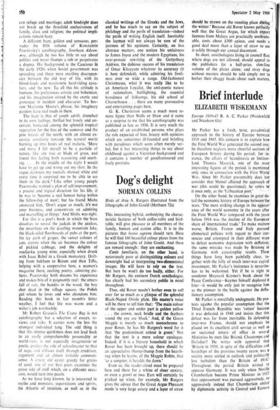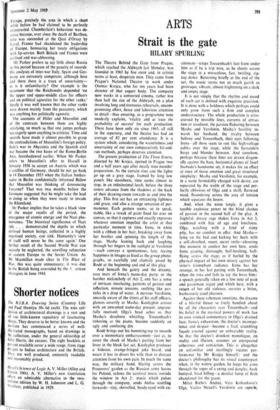Brief interlude
ELIZABETH WISKEMANN
Europe 1919-45 R. A. C. Parker (VVeidenfeld and Nicolson 63s)- Mr Parker has a fresh, terse, paradoxical approach to the history of Europe between 1919 and 1945. His concern is to explain how- the First World War generated the second one; he therefore neglects more cheerful sections of European history during his period; for in- stance, the affairs of Scandinavia or Switzer,' land. Thomas Masaryk, one of the most interesting figures of the pericsd,• is mentioned only once in connection with the First World War. Since Mr Parker presumably does not' consider that Memel affected the approach of war (this could be questioned), he refeh to it once only, as the 'Lithuanian Port.' ' On the other hand, he examines in greatIde-' tail the economic history of Europe between'the wars. 'The most striking change in the rapnearj. ante of the world economy in the years after the First World War compared with the years' before 1914 was the decline of the European share of international trade.' To make matters' worse, Britain, France and Italy pursued chimerical policies with regard to their-Cur= rencies and attempted in their different WayS' to defeat economic depression with deflation;' the same mistake was made by Bruning in Germany with catastrophic results. These things have long been painfully clear, to- gether with the folly of much inter-war capital investment; Mr Parker's insistence is neverthe- less to be welcomed. Yet if he is right to condemn Maynard Keynes's book about the Peace Conference—Keynes himself deplored it later—it would be only just to recognise him as the pioneer in the battle against the defla- tionary assumption.
Mr Parker is mercifully undogmatic. He pro- tests against the popular assumption that the Third French Republic was 'rotten' because it was defeated in 1940 and insists that this defeat was far from inevitable.- In defending inter-war France, should not emphasis be- placed on its excellent civil service as well as on sustained tenure of office in several Ministries by men like Briand, Chautemps and Daladier? He writes with approval that 'Britain in 1939, in spite of the difficulties and• hardships of the previous twenty years, was a• society more united in outlook and politicalIV less turbulent than the Britain of- 1-914: Throughout the period Britain wished to appease -Germany. It was only when Neville Chamberlain became Prime Minister in .1937 that appeasement was pursued -aggressively, so' aggressively indeed that Chamberlain ended' by diplomatic activity in Central and -Eastern
Europe; precisely the area in which a short while before he had claimed to be perfectly uninterested. Chamberlain's behaviour was de- cisive becau,se, ever since the death of Barthou, who was succeeded at the Quai d'Orsay by
Laval, France had abandoned the leadership of Europe, honouring her treaty obligations with lip-service. Both Britain and France were civilised and war-abhorring.
Mr Parker prefers to say little about Russia in this period because of the paucity of records.
His analyses of inter-war Italy, Spain and Ger-
many are extremely competent, although here and there there is a trace of uncertainty—
or is it unfamiliarity? One example is the
statement .that -the • Reichswe•hr depended -`on the upper -and upper-middle class for officers
and on political agnostics for the other ranks.' Surely it was well known that the other ranks were drawn mainly from the peasantry, which was anything but politically agnostic.
The accounts of Hitler and Mussolini and of the contrasts between them are highly satisfying, so much so that one jumps perhaps too eagerly upon anything to criticise. Time and records have made it almost possible to grasp
the contradictions of Mussolini's foreign policy.
Italy's war in Abyssinia and the Spanish civil war became the two bases of the Rome-Berlin Axis, foreshadowed earlier. When Mr Parker
refers to Mussolini's offer to Hassell in January 1936 to accept an'-Austria which was a satellite of Germany, should he not go back
to 14 December 1935 when the Italian Ambas- sador, in Berlin confidentially informed Billow
that Mussolini was thinking of denouncing Locarno? That was two months before the. Germans suggested that he might take the lead in doing so when they were ready to invade the. Rhineland.
Mr Parker implies that he takes a black view of the major results of the period, the
emergence of atomic energy and the-Nazi phe- nomenon. 'The historical significance of Nazi rule . . . demonstrated the depths to which civilised human beings, collected in a highly organised society, can sink. Humanity's view of itself will never be the same again.' One further result of the Second World War can scarcely be neglected, the unwilling subjection of eastern Europe to the Soviet Union. As Mr Macmillan made clear in The Blast of War, this was quite unnecessary; it was due to the British being overruled by the A ..erican strategists in June 1944.



































 Previous page
Previous page